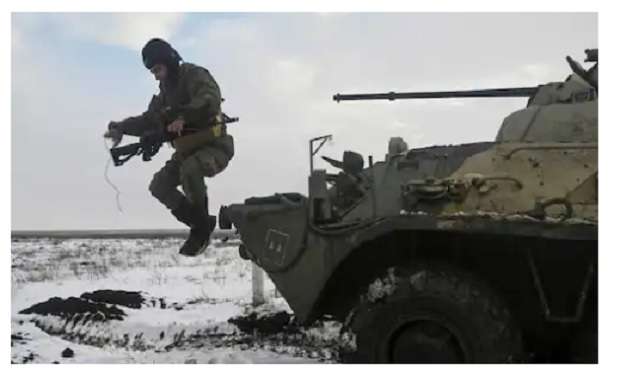The Ukrainian government has asked all its citizens living in Russia – roughly 30 lakh of them — to leave immediately. Ukraine is also calling up all its military reservists, aged 18 to 60, and is also set to declare a month-long state of emergency. Earlier, Ukraine’s parliament passed a vote allowing civilians to carry firearms.
CNBC TV, Ukraine said it has also been targeted by a large-scale cyberattack on its government website and banks. US intelligence shared with Ukraine suggested that a Russian attack was imminent, though Ukraine is taking it with a pinch of salt–previous intelligence reports suggesting similar attacks on February 16 and later 18 did not pan out.
Meanwhile, Russia is reportedly edging its troops closer to the border–US estimates claim 80-100 percent of Russian troops are in invasion-ready formations. Earlier, Russia evacuated its embassy in Kyiv and lowered its flag there
President Vladimir Putin released a video speech earlier, saying he was still open to dialogue but refused to budge on Russia’s interests, saying they were “non-negotiable”
The UN General Assembly is in session. The Secretary-General said the world is “facing a moment of peril”, describing the situation in Ukraine as “the most serious global peace and security crisis in recent years”. US ambassador to the Un Linda Thomas-Greenfield said a Russian invasion of Ukraine could displace as many as 30 million people. The Russian ambassador to the UN, meanwhile, called on the General Assembly to end Ukraine’s “military adventures”.

Western countries have continued to announce sanctions against Russia. After being locked in talks, the EU has approved a package of sanctions that target individuals with a travel ban and asset freeze, as well as restrictions on the Russian state’s ability to access the EU’s financial markets. Notably, the Swiss refrained from announcing sanctions, while Israel called for peace in Ukraine without mentioning Russia. Turkey has offered support to Putin in finding a non-military solution.
UK Prime Minister Boris Johnson has defended his sanctions, criticized widely as being too weak, and said the UK would send more military support to Ukraine.
The media watchdog Ofcom is going to review the license for broadcaster RT — formerly known as Russia Today — after claims it’s used by Putin to spread fake news. RT has called it a “slippery slope” for freedom of speech.
Oil prices fell after a temporary lull in tensions but rose again as the aggressive rhetoric sharpened.
San Miguel Times
Newsroom
